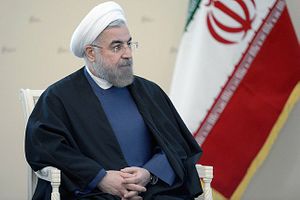Chinese President Xi Jinping wrapped up his first Middle East tour with a visit to Iran, making him the first Chinese president to set foot in the Islamic Republic since 2002. For the most part, Xi’s accomplishments in Iran mirrored the advances he made a few days earlier in Saudi Arabia – an upgraded relationship as well as a focus on energy and economic ties under the “Belt and Road” framework. That’s by design; China doesn’t want to avoid upsetting either Tehran or Riyadh by being seen to favor one or the other, particularly given the tense state of Saudi-Iran relations so far in 2016.
Just as with Saudi Arabia, China upgraded its ties with Iran to a “comprehensive strategic partnership” during Xi’s visit. Xi recommended that the two countries prioritize increased cooperation in energy, infrastructure, industrial capacity, and finance – all areas that fall under the larger subheading of cooperation on the “Belt and Road” initiative. Those four areas feature prominently in China’s discussions with most of its “Belt and Road” partners, including Saudi Arabia. Under the Belt and Road framework, China and Iran set a goal of expanding their bilateral trade to $600 billion in the next ten years – well more than 10 times the $52 billion the two countries did in trade in 2014.
On the political front, a joint statement issued by China and Iran noted that “two sides regard each other as important strategic partners and thus designate the expansion of bilateral relations as a priority of their respective foreign policies.” To help boost political ties, China and Iran agreed to start annual meetings between their foreign ministers. China also reaffirmed its support for Iran to join the Shanghai Cooperation Organization, which would provide another annual forum where the two countries interact (albeit in a multilateral setting).
In addition, the joint statement promised increased defense cooperation in “the fields of human resource training, fighting terrorism and exchange of information, as well as equipment and technology.” China and Iran also agreed to improve law-enforcement cooperation to fight cross-border crime, including cybercrime and drug trafficking.
Meanwhile, as was the case while Xi was in Saudi Arabia, the joint statement largely steered clear of the thorny regional issues that see Riyadh and Tehran at loggerheads. The joint statement merely said both sides were ready “to enhance bilateral consultations” on the crises in Syria and Yemen.
Though Beijing was careful to keep a tit-for-tat in its advances with both Iran and Saudi Arabia, there’s no doubt that China-Iran ties saw more progress on the political front. That’s a testimony to the geopolitical realities in the Middle East. Riyadh, with its close security relationship with the United States, already has a primary political partner while Tehran is eager to pursue a relationship with China precisely because its ties with Washington are so strained. China, however, can’t risk alienating its primary oil supplier by too closely embracing Saudi Arabia’s main rival.
As a sign of the special nature of the China-Iran relationship, Iranian President Hassan Rouhani noted that Xi was the first foreign leader to visit Iran since the Joint Comprehensive Plan of Action was officially implemented. After the International Atomic Energy Agency certified that Iran has followed a deal reached with the so-called P5+1 grouping (China, France, Germany, Russia, the United States, and United Kingdom) to limit its nuclear program, international sanctions are now being lifted. It’s no coincidence that Xi visited Iran a week after the sanctions were rolled back; China wants to ensure that it has a head start in the coming race to up economic ties with Tehran.
Rouhani told Xi that his visit to Iran so soon after “implementation day” for the JCPOA was a sign of the unique, friendly ties between the two sides. Iran’s Supreme Leader Ayatollah Ali Khamenei was more pointed than Rouhani, telling Xi that Iran has “never trusted the West” and wanted to increase ties with “more independent countries” – like China.

































